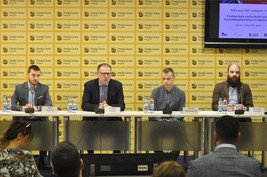Active projects
Active researches
Active evaluations
Analyses of the NCEU Working Group for Chapter 35 presented
Release date: 08.02.2024.
 In the Media Center in Belgrade, the members of the NCEU Working Group for Chapter 35 presented the key findings of the analyses related to Chapter 35 and the relations between Belgrade and Priština in 2023:
In the Media Center in Belgrade, the members of the NCEU Working Group for Chapter 35 presented the key findings of the analyses related to Chapter 35 and the relations between Belgrade and Priština in 2023:1. Analysis of Processing of Attacks on Members of Minority Communities in Serbia and Kosovo in 2023 in the Context of the Belgrade - Priština Dialogue, Youth Initiative for Human Rights, Serbia (YIHR) and New Social Initiative (NSI)
2. Key Challenges for Serbia in the Implementation of the Normalisation Agreement and how to Overcome them, European Policy Centre (CEP) and The Foundation BFPE for a Responsible Society
3. Analysis of the Increase in the Presence of Security Structures in Four Municipalities in the North of Kosovo in the Period 2021-2023, Dragutin Nenezić and Sanja Sovrlić
Dragiša Mijačić, the coordinator of the Working Group of the National Convention on the European Union for Chapter 35 and the moderator of the discussion, referred to the achievement of the agreement on normalisation and the annex to this agreement from February 2023 from Ohrid, noting that the expectations were that the acceptance of this agreement would establish normalisation of the relations and calm the situation between Belgrade and Priština, however, that did not happen.
Marko Milosavljević from the Youth Initiative for Human Rights stated that the majority of attacks on members of minority communities that occurred in 2023 in central Serbia and Kosovo and Metohija have not been prosecuted and no one has been held accountable for that. He said that the research included direct and structural violence of Kosovo institutions against the Serb population in Kosovo, but also by Serbian institutions against Kosovo Albanians living in Serbia.
The recommendations presented in this paper include ending the practice of expropriation of land and a request for transparency of institutions about attacks on members of both the Serbian and Albanian minorities, as well as the cooperation of Serbian and Kosovo institutions regarding the resolution of these issues. They appealed to the courts and prosecutor’s offices to prioritize cases involving minorities.
Miloš Pavković from the European Policy Centre, analyzing the key challenges for Serbia in the implementation of the Agreement on Normalization, questioned Serbia’s desire to implement this agreement in its entirety, since Serbia only verbally accepted it, which may raise doubts that it is a strategy to make this agreement more political than legislative. He also stated that there are points of the agreement that are not fully compatible with the legal system of Serbia, such as the concept of permanent missions, which would have to be regulated by the adoption of special laws.
As recommendations, he stated the need for the implementation of the agreement, its signing and ratification, which would solve the problems on a legal basis. He added that the time frame for implementation should be urgently defined, as well as that the constant support of European officials and institutions is necessary in this process.
Dragutin Nenezić, a lawyer and one of the authors of the analysis of the increase in the presence of security structures in Serbian municipalities in the north of Kosovo, stated that the increase in these security structures is connected with barricades and the withdrawal of Serbs from Kosovo institutions. Nenezić clarified that this analysis dealt with information that is available to the public and that they did not have direct cooperation with the institutions. What is mentioned as a question that arises is the demographic assessment of the territory and the ethnic composition of the institutions.
The event was organized as part of the project "Support for Monitoring Progress in Chapter 35" which is implemented by InTER and financially supported by Sweden within the program of the Belgrade Open School "Civil Society Advancing Serbia's EU Accession Process – Europe ASAP ".
Publications
Resource center
- 08.07.2016.InTER Newsletter 16 Eng
- 20.05.2016.InTER Newsletter 16
















